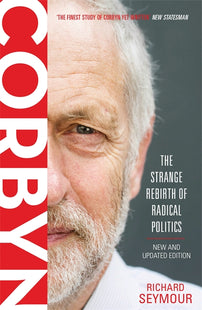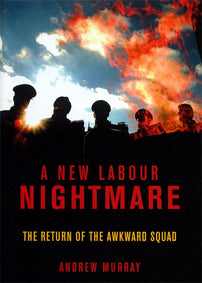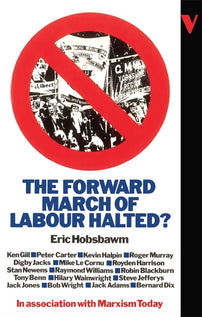No Shortcuts to Socialism: Moving forward from the General Election
Thursday's general election defeat for the Labour Party showed the limitations of Corbynism, and has lead to renewed debate on left strategy in Britain. In this article, Connor Woodman argues that only a focus on deep grassroots organising, alongside parliamentary struggle, can we hope to win future victories.

Over the past few days, I’ve plumbed the depths of desolation and despair, and experienced a hopelessness, a sense of disarray and shock that touched the very core of who I am. Emerging from this, though, I’ve found a renewed sense of energy and commitment.
There are some reasons to be objectively positive, despite the obvious horror of the loss. The UK Left – and by this, I mean the social forces of equality, justice and human liberation – is filled with more energy, ideas and passion than it has been for 35 years. We have proved that there exists a reservoir of energy for the hard, exhausting, day-to-day work of organising and reaching out to the general population. Through this election, many people experienced a solidarity, a community, a hope that we rarely feel. For a not-insignificant portion of the population, we have pierced the belief imposed upon us at every turn that there is no alternative to the current social order. It remains in many ways remarkable that we managed to elect and maintain a radically socialist leadership of one of the largest political parties in the UK for four years, in the face of immense opposition by the ruling powers in this country – and inflicted a massive electoral upset in 2017.
All of that said, we cannot hide away from what is clearly the biggest defeat for the Left in this country since the mid-80s. Here, I advance several propositions to contribute to the task, which will be carried out by thousands, of forming a strategic response to the defeat.
[book-strip index="1" style="display"]1. On defeat
Defeats are an inevitable, painful, harrowing part of any political struggle. How they play out in the long-term depends on two main factors: how we respond to them, and whether they are indicative of an ascendant opponent.
To take the first, we must resist the temptation to succumb to despair and hopelessness. To do this would be to hand the Conservatives and all the forces of inequality, exploitation and suffering a second victory.
Movements have faced darker defeats and have rebuilt and returned. In 1970, Chileans elected a radical socialist government led by Salvador Allende (by the skin of his teeth, after four election attempts). By 1973, that government had been overthrow in a CIA-backed military coup, tens of thousands of people were imprisoned and killed, and a brutal neo-liberal economic system was imposed with the help of US-trained economists. The Chilean people continued to resist, eventually removing Pinochet – and this decade have built one of the most sustained and radical student movements (and now more general street protest movements) on Earth.
Thursday’s defeat was nowhere near as deep as Chile in 1973. If they can rebuild, we can. The Corbyn project was a movement of tens of thousands of people committed to the fight for a better society and future. We have the raw materials of a movement that could become strong enough to shift the balance of forces within society – but that depends on what we do now.
To take the second component determining a post-defeat trajectory, we can compare this loss with the defeats of the 1980s. Labour lost in 1983 to a renewed Conservative Party, a Party that had tethered itself to a dynamic intellectual project (neo-liberalism), and had a solution – however horrific – to the crises of capitalism and society that had brewed and boiled over in the 1960s and 70s. The Conservatives managed to gut and destroy the backbone of working-class organisation, the National Union of Mineworkers. Neo-liberalism cured, for a while, corporations’ problem of profitability, and managed to largely co-opt the liberatory drives of anti-racism, feminism and queer politics. Neo-liberalism was imposed with the inextricable assistance of the coercive arms of the state – the police and intelligence agencies – but nonetheless tapped into enough existing social currents and shaped enough of a coalition to completely reshape the foundations of our society, economy and culture.
Does the Tory Party of Johnson represent such a project, a new political economy that will create a stable political settlement for decades to come? I’m not so sure. The Tory’s election campaign was based on trying to do as little as possible, lest they follow in the footsteps of Theresa May. Hiding from reporters, refusing debates, covering their manifesto in photos rather than policies – these don’t seem like the actions of a dynamic, forward-looking political party ready to reshape the country. They seem like the actions of a party bereft of ideas and solutions to the problems of the 21st century, trying to ride into power through the sheer force of existing neo-liberal ideology, relentless lies and an absurdly establishment-oriented media. As the Economist has already pointed out, Johnson’s victory ‘is a fragile one’.
On the other hand, we can’t underestimate the force of Brexit nationalism – and political projects that scrape through on the back of fragile coalitions can sometimes last. The right has united behind Johnson, and is apparently enthused by his project – 82% of Tory voters actively back the vision of the party, according to the Lord Ashcroft polls (as opposed to 67% of Labour voters). Ninety-five percent of Tory voters thought Johnson would make the best prime minister, as opposed to only 76% of Labour voters for Corbyn. Shockingly, 41% of Tory voters listed the NHS as their number one concern – suggesting Dominic Cumming’s efforts to whitewash the Conservative record on health have been chillingly effective. The Tories have managed to weld together an electoral coalition based on Brexit, nationalism, and a purported end to austerity. We can’t underestimate these challenges.
2. Brexit: the Achilles Heel
Brexit was in the truest sense Labour’s Achilles Heel. It seems that Labour was at least partly successful in winning remain voters, including from the Liberal Democrats. If Labour had failed to offer a second referendum, or had pitched towards Brexit, we would have not only capitulated to a racist right-wing project, but would have lost swathes of remain voters – to a similar result. Maybe an all out Labour-led Lexit campaign back in 2016 could have set the agenda from the Left and turned this whole issue to our advantage. We don’t know, but by the time we got to this election, there was very little Labour could do but try to pivot onto other issues. Judging by the polling though, Brexit was a far more substantial issue for voters this time than in 2017 (the number one issue for 28% of voters in 2017, 57% this year).
But there is a deeper issue with how Labour approached Brexit. Labour’s leadership became embroiled in the minutia of parliamentary manoeuvring around May’s and Johnson’s Brexit plans. For each move Labour made, there was a clear political and rational justification for it. Within the terms of the Westminster game, Labour played an impressive game around Brexit, defeating the Tories at every turn. However, the cumulative effect of this manoeuvring was to make Labour look like just another Westminster party obsessed with parliamentary procedure, hedging bets, avoiding questions – and thwarting the will of the people. If the Corbyn project was ever to win, it had to channel an anti-establishment, insurgent energy – it had to look like something different from the old politics. Trust in politics is at rock bottom (for good reason). Labour’s only chance was to maintain the image and reality of rupture with the old establishment way of politics. Instead, we ended up playing by the rules too well. In essence, the Corbyn leadership failed to follow the strategy of Left populism with enough vigour.
This is probably why the most commonly heard refrain on the doorstep was that ‘they are all the same’, and why it seems that the biggest story of the election in terms of vote swings was 2017 Labour voters staying at home (the data is unconfirmed on this). Instead of Corbyn’s Labour winning the anti-establishment mantle that it patently deserves, the Brexit Right has positioned itself as the wing of resistance, the voice of democracy. Given that this energy has been channelled into electing a silver-spoon fed, privately-educated, born-to-rule toff, this is a ludicrously topsy-turvy world – but this is the terrain as it stands. We have to flip it.
3. Our underlying weaknesses
Regardless of the particular electoral reasons for Thursday’s defeat, it was symptomatic of deep-seated weaknesses with the forces of the Left. These weaknesses are based in the long-term smashing of the power of the working-classes (that is, the overwhelming majority of the population with little ownership of land and capital). Unions are in crisis, public space disappearing, community fractured. Solidarity has become brittle under the weight of racism. These tendencies have undermined the organs of political power that allow us to take on the state and capital. For all our remarkable success, Corbynism was always incredibly precarious, an almost unbelievable anomaly in the context of general Left weakness that was likely to collapse at some point.
Due to these weakness, even if we had won on Thursday, a Labour government would have been besieged from all sides: currency speculation, investment strikes, capital flight, rabid media attacks, civil service sabotage, and probable interference by the intelligence agencies and army top brass. Mobilising tens of thousands of people within a six week period to persuade millions to, at best, put a conditional and temporary cross next to the Labour rose is not the basis of a movement capable of repelling these attacks – it’s not even the basis for electing a left-wing government. We just have to be honest with ourselves about that. With the likely chaos of Brexit, I doubt a Labour government could have lasted more than a year or two. The chances of it being able to implement all but a small fraction of its excellent manifesto would have always been miniscule, short of massive social mobilisation and organisation unseen for decades.
[book-strip index="2" style="display"]This last point is crucial. The reality is that you can’t have a genuine left-wing government with any chance of implementing policies without strong, resilient, highly mobilised working classes. We just can’t do it without durable and strategic organs of political power (in the form of workers and tenants unions, alternative media platforms, institutions of political education, community organising, etc.). There’s no way around this.
4. Deep organising over shallow mobilising
In one sense, we were trying to take a short cut to socialism, to elect a left-wing government without the wider bases of societal counter-power that would have made it possible, that would defend it and push it past its own limitations. Social movements like Stop the War, UK Uncut, the student movement and People’s Assembly made Corbyn possible. But in the last four years, we failed to convert the institutional resources of the Labour Party into means for (re)building long-lasting, deeply embedded organisations that are independent of, but in dynamic interaction with, the broader Labour Party. What organising there was, was largely (and understandably) channelled into the internal structures of the Labour Party, into winning control of and altering the various sections of the Party. The Community Organising Unit has not been scaled enough, or its principles embedded across CLPs. Momentum, for all its positives, has become more of a PR, press and comms machine than the grassroots, member-led organisation of struggle it purports to be (I say this as someone who was proud to be a part of the Momentum comms team during this election).
Instead, we need deep organising. We must create flexible, non-dogmatic, mass-based organisations that provide community, solidarity, support and political education. These must be tenants unions, workers union, community projects that address the real material needs left unmet by the vacant space where the state once stood. We need a social and community infrastructure, Left sports clubs and self-defence groups. We have to act autonomously, building towards a common political strategy: laying the basis for a strengthened Labour Party to take power one day on the back of real popular power and support.
We already have some of these organisations. Acorn’s tenants unions, for instance. Living rent campaigns, anti-detention centre organising, solidarity campaigns with Global South nations and movements – we’re not starting from scratch. But we have to channel our energy, as tens of thousands of Corbynites, into this project. We need to urgently alter Momentum into a hub for disseminating community building strategies and melding together efforts spread across the country. Terrifyingly, electrifyingly, it’s within our power to decide on how we move forward.
But we mustn’t fool ourselves about the enormity of the task ahead. It will be incredibly difficult to build and scale such organisations in the absence of a left-wing government. The restrictions that have been placed on building this kind of power are immense: tight regulation off workers’ and students’ union activity, little legal space for housing and workers’ coops, police infiltration, racist surveillance systems like Prevent, individualistic and despondent attitudes, the destruction of public space. People are under immense pressure to work in difficult and exhausting conditions for meagre pay and ever-rising living costs. These are not the conditions under which working-class self-organisation tends to flourish. The best hope for a Labour government was always that it would lift some of these restrictions and open up the space for social struggle to bloom once more. Take the bourgeois media: as we all know, it’s massively stacked against us, from the Mail to the Telegraph to the BBC. A Labour government could have introduced some of the excellent ideas for media reform advanced by the Media Democracy podcast and others, softening our obstacles in the future. Now, that is out of reach: we can only hope to circumvent the hostile media. That means building up our counter-media platforms.
But we have no other option. We can’t truly begin to transform society without controlling the levers of the state. But we can’t win a radical Labour government without taking the movement that we have and deepening, broadening and strengthening it outside of Westminster and the Party itself. We have to do this long, tough work. There are, as the title of Jane McAlevey’s book on community organising puts it, no shortcuts to socialism. The 2020s must be the decade of (re)building organisations of class power. No more NGOisation – charities and NGOs are deradicalising, they have little to offer us (except perhaps as intellectual centres). Our organisations have to be based on principles of self-organisation, of not playing by the rules – or the law. The powers that be will try to repress these efforts – they always do. But they’re not all-powerful.
None of this means turning our back on the Labour Party. We still have to be there – we have to create a synergy between movement and party. And we’re going to have a real fight on our hands to win the inevitable leadership election. We have to have someone in there who has radical socialist principles, who aims to use social democratic reform as a wedge to break open a wider transformation of society (rather than seeing the reforms as the final end point, as the soft Labour Left does).
We’ve inherited a society where the working classes have been smashed and downtrodden for decades, where the hope for a society ruled by us in our own interests has been ground to a tiny speck of historical memory. The task ahead is immense. But we have to do it. There’s little else that could be worth living for.
5. The two faces of militancy
This renewed movement must have two faces: anger, resentment and resolve when directed towards those at the top, and love, kindness and care towards each other and those we hope to bring onboard. We must, to borrow the popular slogan, be kind to one another so we can be dangerous together.
Our organisations must be class struggle organisations, willing to name and attack the oppressor and exploiter classes of landlords, bosses and managers. There is a reservoir of anger in this country – but it’s often completely misdirected. We have to seize this legitimate anger and channel it against the callous, inhuman, murderous scum that rule our society. We must punch up, not down.
Our movement must also be a place of love, openness and respect for each other, and for the mass of people who are and will suffer under austerity, the hostile environment, and authoritarian work regimes. We must, at all costs, avoid a retreat to the dark days of 2011-2014, when a defeated, small and bitter Left took to insular communities and aggressive mutual attack, rendering the Left an unappealing home for most. We must double down on the practices of ‘collective joy’ developed over the last four years of Corbynism.
The slogan ‘for the many, not the few’ already begins to reintroduce a class politics to the UK’s political discourse. We must point out the astronomical divides between the many and the few, where the UK’s richest six own as much wealth as the bottom 13 million. But we have to go beyond such quantitative accounting, pointing out the irreducibly qualitative elements of class oppression – the relations of domination and exploitation that are viscerally experienced by those subject to it. Left-wing politics has always been about helping people connect such every-day experiences with larger historical forces and structures. Being for the many and against the few must become a politicisation of the class antagonism riven through capitalist society. And, absolutely crucially, any coalition of the ‘many’ must be multi-racial, queer and led by women – and certainly not in thrall to a uniform idea of the white male worker.
As horrifying as this week is – and make no mistake, lots of people will die as a result of it – we must also embrace a sense of excitement and urgency. The Brexit issue is over as a political-strategic issue in front of us. For the next 5-10 years, we are largely freed from the choppy vicissitudes of short-term electoral manoeuvring. We can focus on building the organisations and movement that we all know we need if we’re to really to achieve the root and branch social transformation we so madly, wildly, deeply desire. This week hurts because we care about humanity. Because we know humanity is capable of so much more – and we’ve tasted it. Thanks to the malevolent, embedded forces of the status quo, bringing a new society to fruition is a herculean task. But this herculean struggle is all we have. I, for one, would rather die than give up.








